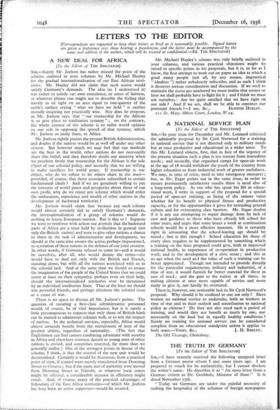LETTERS TO THE EDITOR
[Correspondents are requested to keep their letters as brief as is reasonably possible. Signed letters are given a preference over those bearing a pseudonym, and the latter must be accompanied by the name and address of the author, which will be treated as confidential.—Ed. THE SPECTATOR] SIR,—Surely Mr. Joelson has rather missed the point of the scheme outlined in your columns by Mr. Michael Huxley for the gradual internationalisation of our East African terri- tories. Mr. Huxley did not claim that such action would satisfy Germany's demands. The idea (as I understood it) was rather to satisfy our own conscience, or sense of fairness, or whatever phrase one might use to describe the feeling that merely to sit tight on an area equal to one-quarter of the earth's surface crying "what we have we hold" is neither morally inspiring nor practically wise. Nor does he propose, as Mr. Joelson says, that "our trusteeship for the African is to give place to totalitarian tyranny " ; on the contrary, the whole essence of the scheme is to enlist world opinion on our side in opposing the spread of that tyranny, which Mr. Joelson so justly fears, to Africa.
Mr. Joelson rightly praises the present British Administration, and doubts if the natives would be as well off under any other system. But however much we may feel that our methods are the best in the world, other nations do not necessarily share this belief, and they therefore doubt our sincerity when we proclaim firstly that trusteeship for the African is the sole object of our colonial policy, and secondly that we are willing to make sacrifices for world peace. If trusteeship is our object, why do we refuse to let others share in the trust— provided, of course, that those associates subscribed to certain fundamental ideals ? And if we are genuinely willing to put the interests of world peace and prosperity above those of our own profit, why do we reject any scheme which would enlist the enthusiasm, experience and wealth of other nations in the development of backward territories ?
Mr. Joelson would claim that because any such scheme would almost certainly fail to satisfy Germany's demands, the internationalisation of a group of colonies would do nothing to lessen European tension. But is this so ? Suppose we were to reinforce with action our avowals that the backward parts of Africa are a trust held by civilisation in general (not only the British variety) and were to give other nations a chance to share in the task of administration and development, we should at the same time ensure the active, perhaps impassioned, cc-oxration of those nations in the defence of our joint creation. In other words, if Germany refused to come in—and it would be ourselves, after all, who would dictate the terms—she would have to deal not only with the British and French, standing alone, but with all the nations associated with us in the colonial task. And at the same time we should so arouse the imagination of the people of the United States that we could count at least on their sympathy, perhaps even on their help, should the internationalised territories ever be threatened by an individual totalitarian State. Thus at the least we should win powerful friends, and perhaps eliminate the colonial issue as a cause of war.
There is no space to discuss all Mr. Joelson's points. The question of securing a first-class administrative personnel would, of course, be of vital importance, but it is surely a little presumptuous to suppose that only those of British birth can be trained to administer colonies well, or to win the respect of natives. In the technical services, especially, Africa would almost certainly benefit from the recruitment of men of the greatest ability, regardless of nationality. (The fact that Englishmen can find careers combining adventure with security in Africa and elsewhere overseas denied to young men of other nations is envied, and sometimes resented, far more than we generally realise.) One of the strongest points in favour of the scheme, I think, is that the control of the new unit would be decentralised. Certainly it would be disastrous, from a practical point of view, if control were merely transferred from Downing Street to Geneva ; but if the main seat of authority were moved from Downing Street to Nairobi, or whatever local centre might be selected, a considerable increase in efficiency might result. And, of course, many of the practical advantages of federation of the East Africa territories—of which Mr. Joelson has long been an active supporter—would be secured. Mr. Michael Huidey's scheme was only briefly outlined in your columns, and various practical objections might be raised to specific points in his proposals, but it is, so far as I know, the first attempt to work out on paper an idea to which a good many people (not all, by any means, impractical "idealists ") rather nebulously subscribe, and as such I think it deserves serious consideration and discussion. If we wish to maintain the status quo unaltered we must realise that sooner or later we shall probably have to fight for it ; and I think we must ask ourselves : Are we quite satisfied that we have right on our side ? And if we are, shall we be able to convince our














































 Previous page
Previous page